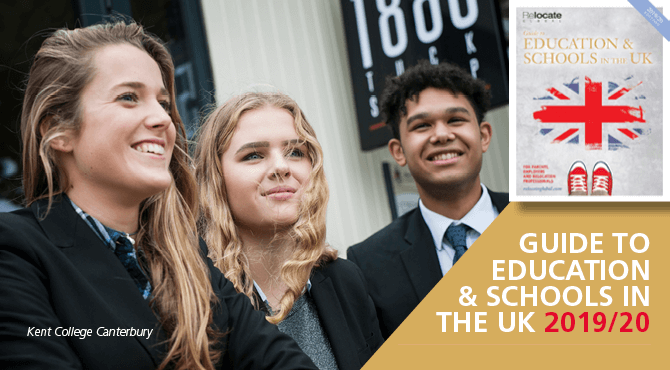Education after Brexit: 'A force to unite nations'
Following Britain’s referendum on its European Union membership – in which nearly three-quarters of those aged 18–24 voted to remain – school leaders in the UK have spoken about how the principles that underpin a modern, internationally minded education can serve to unite nations during the current period of uncertainty.
Diversity leads to understanding
Writing in the Telegraph newspaper following the Brexit vote, the late John Walmsley, principal of United World Colleges’ (UWC) Atlantic College in South Wales, spoke of how his diverse students were responding to the UK’s decision to leave the EU. According to a post-referendum breakdown, nearly three-quarters of voters aged between 18 and 24 voted to remain. This came as no surprise to Mr Walmsley. “Nowadays, most of our international students cannot imagine the continent without agreements and organisations such as Schengen and Erasmus,” he said. “Even in an unstable modern world, one thing became increasingly clear to me over the campaign: young people simply do not have the same concerns with immigration, collaboration and pluralism that older generations have.”Indeed, writers and school leaders typically agree that today’s students possess an unprecedented global and cultural awareness. Tim Jones, deputy head (academic) of Sevenoaks School, in Kent, a coeducational day and boarding school for students aged 11–18 that offers the International Baccalaureate (IB), agrees. “As an IB school since 1978, Sevenoaks offers an education with a strong global dimension in an open-minded, cosmopolitan environment including students from over 40 countries. We believe fully in the virtues of a broad, international and connected education.“The IB has a mission to develop intercultural understanding,” he continues. “Our pupils leave knowing that they have a responsibility to work towards a better world. We believe that the problems of the world have as their root cause failures to communicate, to understand and to empathise, and we celebrate the unity in diversity that our students and staff generate. Similarly, the aims of the EU include establishing European citizenship, protecting fundamental human rights, and ensuring freedom, security and justice.”But, as Antony Spencer, principal of St Lawrence College, Ramsgate, an independent day and boarding school for pupils aged from three to 18, points out, the picture provided by the latest pupil data shows that diversity is growing across a wide range of schools in the UK. “The Independent Schools Council’s 2017 Census provides interesting information about independent schools in the UK, including the statistic that 32 per cent of pupils are now from a non-white background, a rise of 9 per cent over the last eight years. And the figures for state schools are broadly the same,” he says.
According to a post-referendum breakdown, nearly three-quarters of voters aged between 18 and 24 voted to remain. This came as no surprise to Mr Walmsley. “Nowadays, most of our international students cannot imagine the continent without agreements and organisations such as Schengen and Erasmus,” he said. “Even in an unstable modern world, one thing became increasingly clear to me over the campaign: young people simply do not have the same concerns with immigration, collaboration and pluralism that older generations have.”Indeed, writers and school leaders typically agree that today’s students possess an unprecedented global and cultural awareness. Tim Jones, deputy head (academic) of Sevenoaks School, in Kent, a coeducational day and boarding school for students aged 11–18 that offers the International Baccalaureate (IB), agrees. “As an IB school since 1978, Sevenoaks offers an education with a strong global dimension in an open-minded, cosmopolitan environment including students from over 40 countries. We believe fully in the virtues of a broad, international and connected education.“The IB has a mission to develop intercultural understanding,” he continues. “Our pupils leave knowing that they have a responsibility to work towards a better world. We believe that the problems of the world have as their root cause failures to communicate, to understand and to empathise, and we celebrate the unity in diversity that our students and staff generate. Similarly, the aims of the EU include establishing European citizenship, protecting fundamental human rights, and ensuring freedom, security and justice.”But, as Antony Spencer, principal of St Lawrence College, Ramsgate, an independent day and boarding school for pupils aged from three to 18, points out, the picture provided by the latest pupil data shows that diversity is growing across a wide range of schools in the UK. “The Independent Schools Council’s 2017 Census provides interesting information about independent schools in the UK, including the statistic that 32 per cent of pupils are now from a non-white background, a rise of 9 per cent over the last eight years. And the figures for state schools are broadly the same,” he says. “London is probably leading the way, as ever; here, over 50 per cent of pupils in independent schools are from the inappropriately named ‘minority ethnic’ category. So, in aggregate, the UK is increasingly ethnically diverse, although the distribution is patchy between schools and areas. It is a similar picture with socio-economic diversity, with a third of all independent-school pupils receiving some degree of fee support.“The case for a diverse school,” says Mr Spencer, “is essentially based on what we think the purpose of an education is. If we see education as preparing pupils not only to take exams and get into university but also to thrive in the future, then the sooner our children get used to living in a diverse world, the better for them. Their future will involve working in coalitions of people across countries, in fluid teams with all kinds of backgrounds, where communication across cultures will be fundamental to success, and where insensitivity to difference could lead to failure.”
“London is probably leading the way, as ever; here, over 50 per cent of pupils in independent schools are from the inappropriately named ‘minority ethnic’ category. So, in aggregate, the UK is increasingly ethnically diverse, although the distribution is patchy between schools and areas. It is a similar picture with socio-economic diversity, with a third of all independent-school pupils receiving some degree of fee support.“The case for a diverse school,” says Mr Spencer, “is essentially based on what we think the purpose of an education is. If we see education as preparing pupils not only to take exams and get into university but also to thrive in the future, then the sooner our children get used to living in a diverse world, the better for them. Their future will involve working in coalitions of people across countries, in fluid teams with all kinds of backgrounds, where communication across cultures will be fundamental to success, and where insensitivity to difference could lead to failure.”An internationalist approach
The brainchild of German philosopher Kurt Hahn, UWC Atlantic College was established during the height of the Cold War with, according to its prospectus, “the founding principle of bringing different students together regardless of race, religion or creed”.“The UWC movement has tried to make education a force to unite people, nations and cultures for peace and a sustainable future for the world,” says John Walmsley. “What I think the [referendum] vote does undeniably represent is the appetite among young people for a more internationalist approach to education.”Speaking at an IB conference, Dr Siva Kumari, the IB’s director-general, echoed this view. “The enemies of international-mindedness are themselves a global phenomenon,” she said, “and are making full use of globalisation’s technologies. Such developments demonstrate how necessary international-mindedness is, in a world which is becoming ever more global without growing ever closer together.”“A look at the headlines from around the world confirms our view that the world is sorely in need of ideas that will bring people, countries and cultures together,” says Tim Jones, “and we think that the IB Diploma Programme stands for the very best possible educational background for the young people most likely to come up with these ideas.”
Preparing for an unknown future
Within an internationally minded school, there is often an imperative that students not only learn what they need to complete their studies but also learn to think critically and be open to new ways of operating, so they are ready for an unknown future.“In any period of political and economic uncertainty, the value of a broad education of mind and character rises,” says Tim Jones. “At Sevenoaks, some 1,080 young people study with over 150 teachers and discover the value of working alongside people with different backgrounds. They desire to become compassionate, responsible global citizens.“The IB Diploma Programme suits this aim very well. Not affiliated to any national government’s agenda, it has remained relatively stable and aspirational when competing qualification systems have been downgraded by compromise and disturbed by the caprice of successive governments.“It is an internationally understood and valued qualification, and the mix of nationalities and cultures that naturally gravitate towards it means that an IB school or classroom is inherently a melting point of viewpoints and opinions, often hotly debated in a safe environment.“Academic freedom is actively supported and encouraged in the IB, which is known for providing opportunities for interdisciplinary teaching and learning. At Sevenoaks, we do not find rigid demarcation between different subject areas particularly helpful; in fact, it is often in the interstices between subjects where we find the most interesting ideas. Similarly, across the school and curriculum, we find an approach of both/and more productive than one of either/or – an inclusive attitude that prepares students well for undergraduate studies.”Optimism for the future
Arguably, an internationally minded learning environment allows students to develop the enquiring mind that is necessary to succeed in the future global workplace. “No one knows what the future holds. No one knows how sustainable the globalisation and digitisation of the world is,” says Mr Jones. “All that appears to be certain is great uncertainty. That is why inculcating skills of inquiry, resilience and curiosity, as well as empathy and a tolerance of views not their own, represents for us the best preparation for bright, well-motivated young people.“In light of Brexit,” he concludes, “our view is that education in the UK needs to become even more European in its outlook in order for our teenagers to prosper in an increasingly global community.” This article was refreshed on 24 July 2019.
Now available as an ebook on Amazon! Simply download from Amazon onto your Kindle, mobile phone or tablet to read wherever you are!
Access hundreds of global services and suppliers in our Online Directory
 Get access to our free Global Mobility Toolkit
Get access to our free Global Mobility Toolkit  © 2019. This article first appeared in the 2016 edition of the Guide to International Education & Schools published by Relocate Global, Spray Hill, Hastings Road, Lamberhurst, Kent TN3 8JB. All rights reserved. This publication (or any part thereof) may not be reproduced in any form without the prior written permission of Relocate Global. Relocate Global accepts no liability for the accuracy of the contents or any opinions expressed herein.
© 2019. This article first appeared in the 2016 edition of the Guide to International Education & Schools published by Relocate Global, Spray Hill, Hastings Road, Lamberhurst, Kent TN3 8JB. All rights reserved. This publication (or any part thereof) may not be reproduced in any form without the prior written permission of Relocate Global. Relocate Global accepts no liability for the accuracy of the contents or any opinions expressed herein.




























